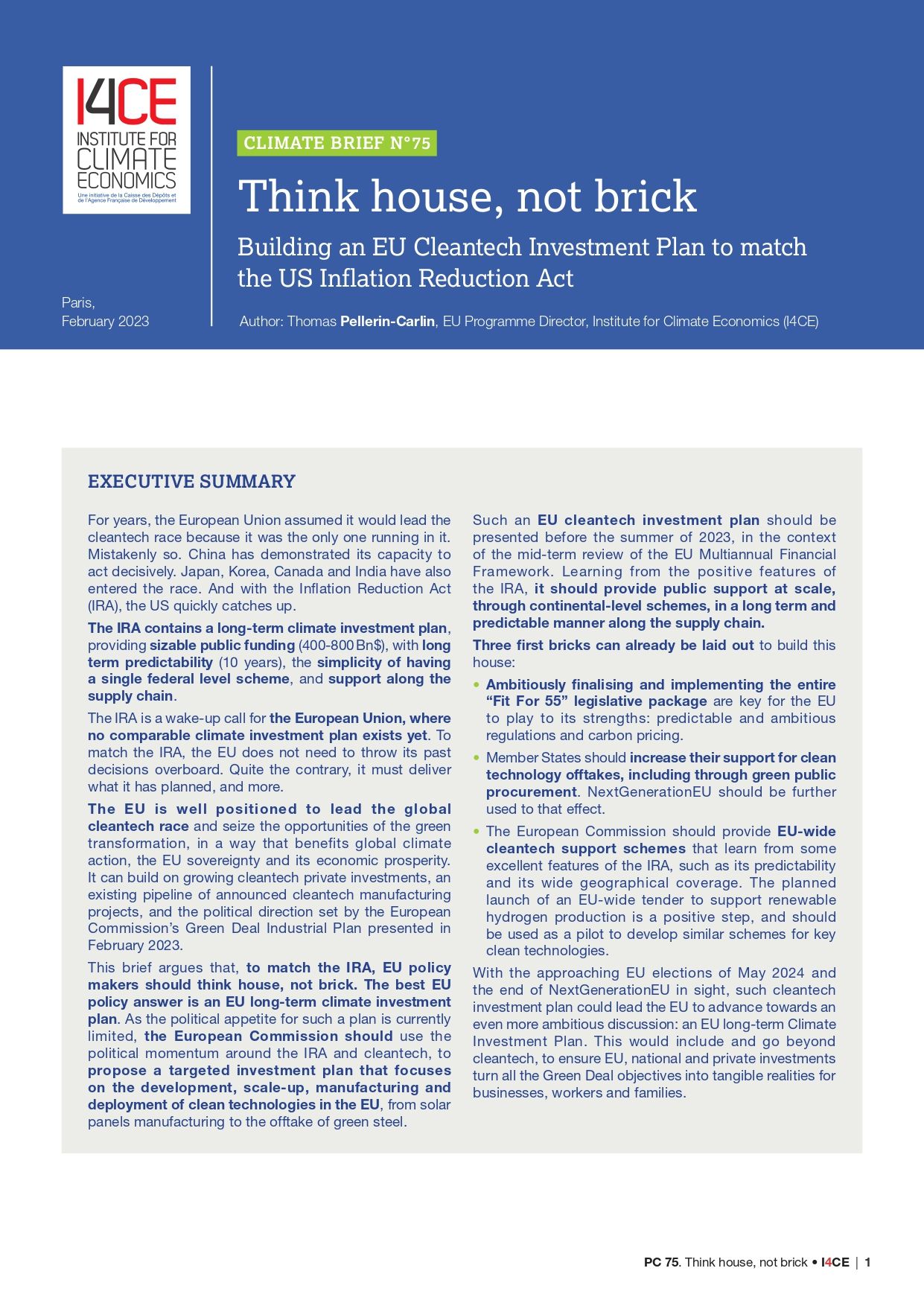Think house, not brick: building an EU Cleantech Investment Plan to match the US Inflation Reduction Act
For years, the European Union assumed it would lead the cleantech race because it was the only one running in it. Mistakenly so. With the Inflation Reduction Act, the US quickly catches up. This brief argues that the best EU policy answer to the IRA is an EU long‑term climate investment plan. As the political appetite for such a plan is currently limited, the European Commission should use the political momentum to propose a targeted investment plan that focuses on the development, scale-up, manufacturing and deployment of clean technologies in the EU. It identifies three first bricks that can already be laid out to build this plan.
For years, the European Union assumed it would lead the cleantech race because it was the only one running in it. Mistakenly so. China has demonstrated its capacity to act decisively. Japan, Korea, Canada and India have also entered the race. And with the Inflation Reduction Act (IRA), the US quickly catches up.
The IRA contains a long‑term climate investment plan, providing sizable public funding (400-800 Bn$), with long term predictability (10 years), the simplicity of having a single federal level scheme, and support along the supply chain.
The IRA is a wake-up call for the European Union, where no comparable climate investment plan exists yet. To match the IRA, the EU does not need to throw its past decisions overboard. Quite the contrary, it must deliver what it has planned, and more.
The EU is well positioned to lead the global cleantech race and seize the opportunities of the green transformation, in a way that benefits global climate action, the EU sovereignty and its economic prosperity. It can build on growing cleantech private investments, an existing pipeline of announced cleantech manufacturing projects, and the political direction set by the European Commission’s Green Deal Industrial Plan presented in February 2023.
This brief argues that, to match the IRA, EU policy makers should think house, not brick. The best EU policy answer is an EU long‑term climate investment plan. As the political appetite for such a plan is currently limited, the European Commission should use the political momentum around the IRA and cleantech, to propose a targeted investment plan that focuses on the development, scale-up, manufacturing and deployment of clean technologies in the EU, from solar panels manufacturing to the offtake of green steel.
Such an EU cleantech investment plan should be presented before the summer of 2023, in the context of the mid-term review of the EU Multiannual Financial Framework. Learning from the positive features of the IRA, it should provide public support at scale, through continental-level schemes, in a long term and predictable manner along the supply chain.
Three first bricks can already be laid out to build this house:
- Ambitiously finalising and implementing the entire “Fit For 55” legislative package are key for the EU to play to its strengths: predictable and ambitious regulations and carbon pricing.
- Member States should increase their support for clean technology offtakes, including through green public procurement. NextGenerationEU should be further used to that effect.
- The European Commission should provide EU‑wide cleantech support schemes that learn from some excellent features of the IRA, such as its predictability and its wide geographical coverage. The planned launch of an EU‑wide tender to support renewable hydrogen production is a positive step, and should be used as a pilot to develop similar schemes for key clean technologies.
With the approaching EU elections of May 2024 and the end of NextGenerationEU in sight, such cleantech investment plan could lead the EU to advance towards an even more ambitious discussion: an EU long‑term Climate Investment Plan. This would include and go beyond cleantech, to ensure EU, national and private investments turn all the Green Deal objectives into tangible realities for businesses, workers and families.
